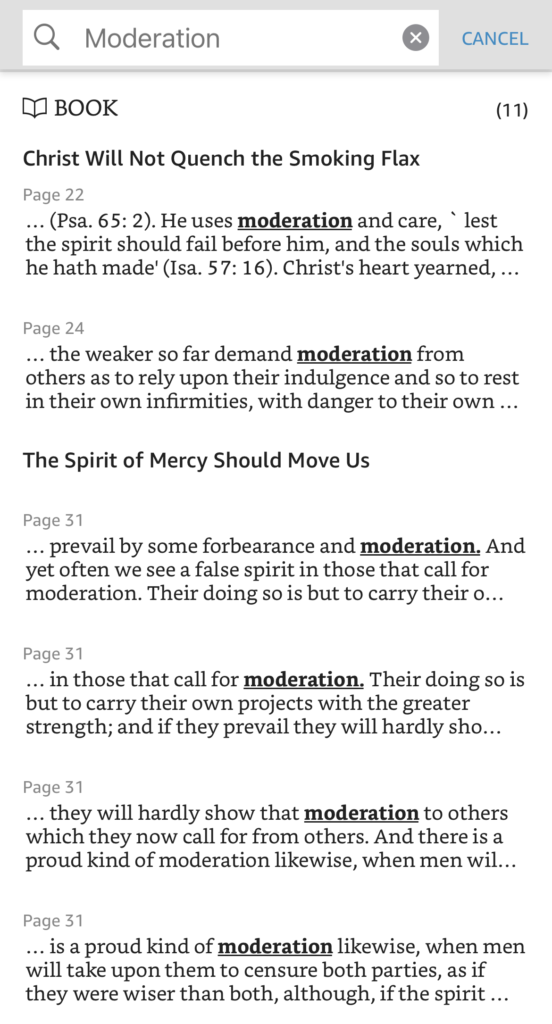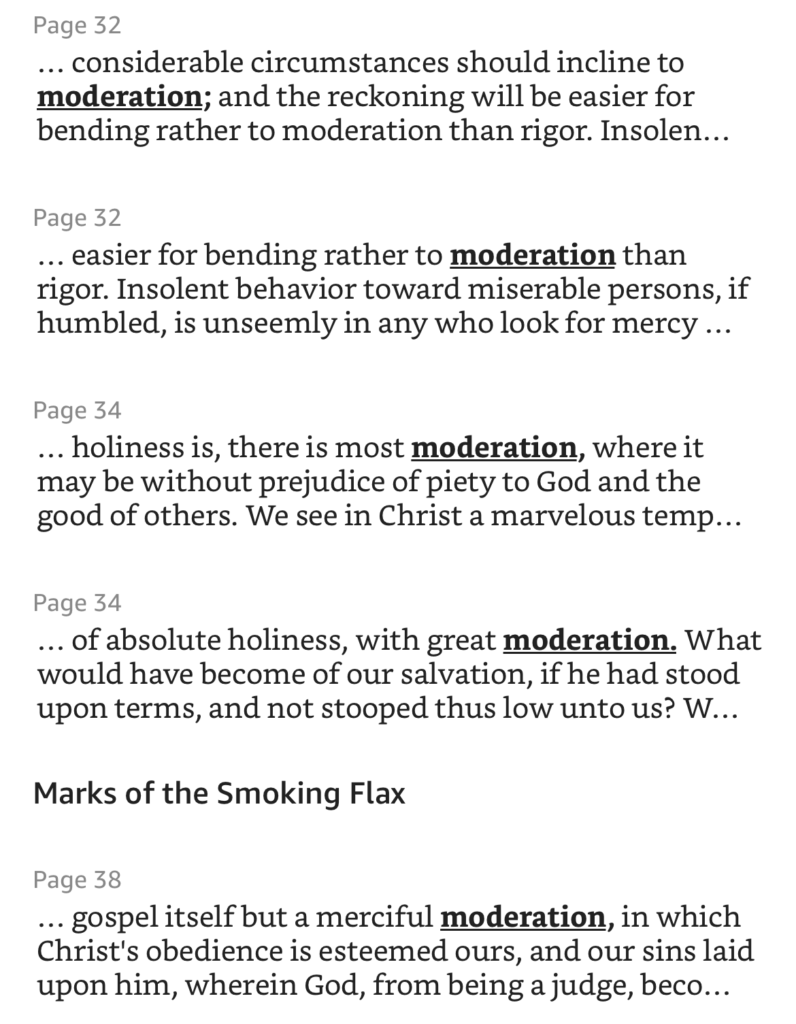Ch 6 Marks of the Smoking Flax
Assurance
This chapter is about “assurance” (though Sibbes does not use that term). The theology of “assurance” is the persuasion we have that we have peace with God, our sin issue resolved, such that we know now that we possess eternal life, and that upon our passing we will enter into direct relationship with God–“heaven”–unmediated by our present mortal, still sin-laden life.
Sibbes in Ch 6 continues his exposition of smoking flax. Previously he applied such smoking to the obscuration of the existent flame (light) present by varies degrees of immaturity and sin itself in various forms. Here in this Ch 6 he makes the fundamental point that smoking flax is evidence of God’s work of redemption in us not, as some might think, some sign of its being, or having been, extinguished. So, the “smoke” is the sign of “the fire,” as in the old saying: where there’s smoke, there is fire.
Before we begin in Sibbes, let us first consider other resources on the doctrine of assurance.
Assurance in the Westminster Confession of Faith
A full discussion, but by no means exhaustive, of assurance is contained in a cluster of chapters of the Westminster Confession of Faith (WCOF), namely:
- Ch 11: Justification
- Ch 12: Adoption
- Ch 13: Sanctification
- Ch 14: Saving Faith
- Ch 15: Repentance Leading to Life
- Ch 17: The Perseverance of the Saints
- Ch 18: The Assurance of Grace and Salvation
A pdf of WCOF is available online.
Ch 18 specifically on “assurance” in WCOF uses the following characterizations for the substance of assurance:
- being in God’s favor,
- being saved,
- assured with certainty…[to be] in a state of grace,
- [that we] rejoice in the hope of the glory of God,
- never [to be] ashamed of that hope,
- infallible assurance of faith,
- inner evidence of spiritual insight,
- testimony of the Spirit of adoption,
- we are the children of God,
- [having] the pledge of our inheritance,
- sealed until the day of redemption,
- the certainty of…[one’s] calling and election,
- sense of His presence, the life of faith,
- [the thing] which the Spirit…revive[s].
There are two possible errors regarding assurance: one is have new life in Christ but lack (or lose) confidence that such is so, and the other is to have confidence that one is the object of God’s Grace but it not be so.
WCOF expresses these opposites as follows:
Truly Founded Assurance (WCOF): “But since the Spirit enables believers to know the things which are freely given to them by God, every believer may come to a full assurance of salvation by the ordinary working of the Spirit without unusual revelation. Therefore it is every believer’s duty to establish the certainty of his calling and election so that his heart may be filled with peace and joy in the Holy Spirit, with love and thankfulness to God, and with strength and cheerfulness of obedience.”
False Assurance (WCOF): “Hypocrites and other unregenerate men may deceive themselves with false hopes and carnal presumptions about their being in God’s favor and about their being saved. Their presumptions will die [but not into nihilism] with them.”
Westminster Confession of Faith, 1647, Ch 18, “The Assurance of Grace and Salvation,” Para. 3 and Para. 1, respectively.
We can think of such pair of beliefs in the mode of Type 1 and Type 2 errors. One graphic example is parachutes. A Type 1 error (failure) is when one activates the ‘chute,’ pulls the rip cord, but it does not open. A Type 2 error is that the chute opens without having been activated. Both are bad outcomes, one–the false belief that the parachute will deploy (i.e. is “true”)–is destined to be far worse than the other. But Type 2 errors are not good, and to be avoided.
Type 1 Spiritual Error: False Confidence of TRI
Put in the context of Scripture, consider this error:
21 “Not everyone who says to me, ‘Lord, Lord,’ will enter the kingdom of heaven, but the one who does the will of my Father who is in heaven. 22 On that day many will say to me, ‘Lord, Lord, did we not prophesy in your name, and cast out demons in your name, and do many mighty works in your name?’
Matt Ch 7 (ESV)
23 And then will I declare to them, ‘I never knew you;
depart from me, you workers of lawlessness.’
The above text from the Gospel of Matthew is often considered to be the most frightening text in the NT. It expresses the false conviction of “many” that they belong to the Lord by virtue of three claims: (1) speaking on behalf of the Lord, (2) working to cast out demons, and (3) “mighty works” all in the the name of the Lord. Yet, the Lord Himself casts them away because He, the Lord, never knew such claimants.
Could that be you? Could it be me? Could it be who we listen to preaching, or read? Could it be one’s closest fellow pilgrims?
How can one know such answer? How do you know the answer?
Sibbes helps us answer such question in his Ch 6 by extracting principles of rightful assurance.
Type 2 Spiritual Error: Lack of Assurance
Sibbes Ch 6 deals with the other error, that of a true recipient of God’s Grace who goes through a period of severe doubt as to being such, or is continually plagued by such doubt. There are many possible causes for having such false apprehension, but we’ll defer that part of the discussion. Here, let us simply ask two questions: (1) can we properly possess such assurance, and if so, (2) on what basis?
Question 1: Is assurance possible (according to the Scriptures)?
Sibbes answered this question in the opening chapters of The Bruised Reed by the very framework of our study, namely that Jesus Christ came to save sinners, which was expressed in one form in Isaiah’s prophecy and confirmed in Matthew’s Gospel, namely: a bruised reed He (Jesus Christ, Messiah) will not break, a smoking flax He will not quench.
And we see that worked out in the biographies of the NT characters as in the OT. God is at work in the lives of His own, dealing again and again in the context of smoky flax.
The NT gives us the picture of being sons (daughters) of our Heavenly Father, a condition of birth, which is not possible to be otherwise, nor changed. Further we are given the illustration of sheep and goats–and no sheep becomes a goat, or vice versa–and wheat and tare, which are permanently distinct by essential character.
God gives us the picture of a Book of Life, permanently and securely in the eternal unboundedness of God’s very ‘library,’ into which our names have been written, like a ship’s manifest, as passengers in this present transitory journey awaiting boarding on an eternal vessel of God’s making.
Nevertheless, do not rejoice in this, that the spirits are subject to you,
Luke 10:20 (ESV)
but rejoice that your names are written in heaven.
We see in the Book of Job a man who is accosted by his closest friends with the charge that some great unconfessed sin of Job’s has been the cause of all the massive adversities he has now experienced. And, they claim, but for Job’s repentance such foretells his permanent, irreconcilable doom, portrayed for us by their final silences and withdrawal upon Job’s denial of their claim. But in that dialogue, more on that below, we see Job sort through all that he knows, and can know limited as it is as to his circumstances, and comes to a conviction of his faith and God’s redemption: “For I know that my Redeemer lives.” (Job 19:25, ESV)
The claim that “yes” one can presently have assurance of one’s genuine favor of God, even / especially in the context of overwhelming adversities, and Who will secure present and eternal redemption / salvation, is a great divide in Christendom. For those of Arminian belief systems, which would include both Roman Catholics and many Protestant traditions and practices, the answer is an emphatic “no,” even “emphatically NO!,” because, it is a rock solid conviction, that one cannot know whether one has ever done enough, been sufficiently faithful / sacrificial–sinless even, at least with respect to ‘the big sins’ (“mortal”). Such is the distinction between works salvation, relying on what one has done as being the distinctive for entry to God’s heaven, verses what Christ has done and completely, securely finished (as His final words on the Cross: “It is Finished!” John 19:13)
It should be noted that the fearful Matt 7 passage quoted above referenced the “many,” who claimed as their grounds of belonging to God, was based their ‘good’ works, both specific and general. And we should also note that such “many” were the most-religious people of the NT time, the Pharisees (and the priests and scribes), who were the object of the Lord’s condemnation (Matt 23) and the warning to His hearers that “unless your righteousness surpasses that of the Pharisees…you will not enter heaven” (Matt 5:20, as part of “The Sermon on the Mount”), a statement that must has shocked and terrified its hearers.
Question 2: On what basis, by what process / evidences, can you (me) know the answer to be an affirmative “Yes?”
This is the central question of “assurance.”
The second most-printed book in the English language has been John Bunyan’s Pilgrim’s Progress. His initial book (a second book came later) is the story of a man name Christian who has been persuaded to flee his home, “The City of Destruction,” to complete a life journey to “The Celestial City.” There are several early key events that have debated as to what Bunyan intended to show as “being born again” or “the assurance of being born again” or something else. (Of course, Bunyan’s writing is not Scripture, so whatever he intended does not automatically make it Biblical, and his entire book is a symbol expressed as a literal dream). But we are left with at least these choices: responding to the call to leave his home on this journey, the emergence from the “swamp of despond” helped (by “Help”), the deeper revelation from “Evangelist,” entering and passing through “the narrow gate,” his shedding of the burden of his backpack at his encounter at “the Cross.”
The question is when (in our economy of spacetime) was Christian “saved,” and when did he experience the assurance of “being” saved? These are not the same thing, and may not occur at the same time. In the experience of some Christians such distinctive realizations can occur at widely separated times, even years. For others, especially those who came to faith early in life, there can be no time where they did not have both the experience and the assurance of the experience of faith. Further, as stated in the WCOF Ch 18, there can be ebbs and flows in one’s experience in, confidence of, assurance.
Martyn Lloyd Jones (MLJ) taught extensively on the passage in Romans Ch 8 relating to this topic of assurance. MLJ emphasized one aspect of such assurance by his exposition of the Spirit calling out within us “Abba Father!” Then in the latter verses of Romans Ch 8 he expounds on assurance in reference to the famous verses beginning “all things work together for good for those who love God.” These two passages are in Romans 8:
14 For all who are led by the Spirit of God are sons of God. 15 For you did not receive the spirit of slavery to fall back into fear, but you have received the Spirit of adoption as sons, by whom we cry, “Abba! Father!” 16 The Spirit himself bears witness with our spirit that we are children of God, 17 and if children, then heirs—heirs of God and fellow heirs with Christ, provided we suffer with him in order that we may also be glorified with him.
Romans 8:14-17, ESV
31 What then shall we say to these things? If God is for us, who can be against us? 32 He who did not spare his own Son but gave him up for us all, how will he not also with him graciously give us all things? 33 Who shall bring any charge against God’s elect? It is God who justifies. 34 Who is to condemn? Christ Jesus is the one who died—more than that, who was raised—who is at the right hand of God, who indeed is interceding for us. 35 Who shall separate us from the love of Christ? Shall tribulation, or distress, or persecution, or famine, or nakedness, or danger, or sword?
Romans 8:31-35, ESV
These lectures by MLJ can be found within his very extensive, verse by verse teaching series of Romans, here and here and here and here.
Let us now turn to Sibbes Ch 6 and see his working through this matter of assurance following his pastoral comforting approach.
Sibbes’s Opening Text of Ch 6
We must have two eyes,
one to see imperfections in ourselves and others, the other to see what is good.…Those who are given to quarrelling with themselves always lack comfort,
and through their infirmities they are prone to feed on such bitter things as will most nourish that disease which troubles them.…We must not judge of ourselves always according to present feeling, for in temptations we shall see nothing but smoke of distrustful thoughts. … Life in the winter is hid in the root.
…By false conclusions we may come to sin against the commandment in bearing false witness against ourselves. …for so we should dishonor the work of God’s Spirit in us, and lose the help of that evidence which would cherish our love to Christ, and arm us against Satan’s discouragements..
Sibbes, Ch 6
What is True, Truth?
Sibbes begins where one should always begin by asking “what is true?” here:
We must beware of false reasoning, such as: because our fire does not blaze out as others, therefore we have no fire at all. By false conclusions we may come to sin against the commandment in bearing false witness against ourselves.
Sibbes, Ch 6, Introduction
At crucial times, especially times of great adversity or confusion and despair, or all three, the most useful thing one can do is ground down to asking “what is true?” Even in the chaos of a work project–better earlier asked than after things begin to come apart–asking this question is often the door to a way out.
Martyn Lloyd Jones (MLJ) advised a four step process when in such difficult situation:
- Stop and think. This is so rarely done, and so important, that it deserves its own place in the process, and the first place in the process.
- Ask yourself what you know to be true. MLJ’s context is clearly going back to one’s grasp of the fulness of Scripture (which fulness should be our life quest), and grounding in its fundament truths.
- Apply what you know to be true to your present situation.
- That which cannot be answered (in some way, whatever way), leave to God’s Providence.
Truth: Koine A-lee-THEE-ah (Strong’s G225, ἀλήθεια alḗtheia)
What does Scripture say about “Truth?” The primary Greek Koine word is alḗtheia. The word occurs more than 100 times in each the NT and the OT (the LXX, Greek text of the OT). I invited you to do a internet search (Google or some other) by typing in the search window: strongs g225; that will lead you to multiple sites that give expanded discussion of the meaning and all the citations in the NT and even the OT. Included in such list will be Pilate’s lingering question, reflecting the darkness of The Political Industry (TPI): “What is truth (alḗtheia)?” (John 18:38)
For our purposes, consider just the well-known passage in Philippians Ch 4:
8 Finally, brothers, whatever is true, whatever is honorable, whatever is just, whatever is pure, whatever is lovely, whatever is commendable, if there is any excellence, if there is anything worthy of praise, think about these things
Phil 4:8 (ESV, emphasis mine)
This verse lists eight great nouns, and one imperative verb (“think”). But the list is almost surely ordered purposefully, and significantly, to begin with “whatever is true (alḗtheia).”
Our situation, unlike Pilate’s (representative of TPI), or the Pharisee’s (representative of The Religion Industry, TRI, blinded by its hatred of Grace), is that we have access to truth. Not all of it, not fully, not inherently inerrantly. Mysteries and puzzles remain. But there are some certain things we can know because God has chosen to reveal them to us. He wants us to know Him; it’s part of His Work of Grace. But we see in a mirror darkly, though we will see Him face to face. That dark mirror is like the smoking flax. There is a ‘there’ there, a knowable reality. We can trust God that we can know what we need, when we need it, as we need it.
6.1 Our Rule is the Covenant of Grace
… we must look to grace in the spark as well as in the flame… It is one thing to be deficient in grace, and another thing to lack grace altogether.
God knows we have nothing of ourselves, therefore in the covenant of grace he requires no more than he gives, but gives what he requires, and accepts what he gives: …
What is the gospel itself but a merciful moderation, in which Christ’s obedience is esteemed ours, and our sins laid upon him, wherein God, from being a judge, becomes our Father, pardoning our sins and accepting our obedience, though feeble and blemished?
Sibbes 6.1
6.2 The Presence of the Heavenly Fire
Sibbes gives 10 “rules”–tools of evidence–by which we may comfort ourselves, others, and our perception of others as to the genuineness of God’s presence, the fire within the smoking flax:
- Presence of God’s “light.” 2 Cor 4:6; Is 8:20
- Presence of God’s “heat.” 2 Tim 1:7
- Presence of “directed light.” Is 50:11; Ps 18:28; Job 18:5; Rev 3:8
- Presence of “separating fire.”
- Presence of “delight in the light.” 1 Sam 25:32; Gal 5:17
- Present of “active fire.” Rom 7:13
- Presence of “malleability from fire.”
- Present of “propagating fire.” 1 Cor 10:31
- Presence of “fire’s sparks going upward.” (1) constancy, (2) spirituality, (3) genuine desire. Ps 119:5; Rom 7:24. (4) continuing
- Presence of “ever enlarging, purifying fire.”
Jesus Christ as Mediator and Surety
Let us return to the WCOF to grasp another key truth relevant to assurance.
In WCOF Ch 8 we have a concise description of the Person and Work of Jesus Christ. It begins with this glorious statement.
1. It pleased God, in his eternal purpose, to choose and ordain the Lord Jesus, his only-begotten Son, to be the Mediator between God and man,a the Prophet,b Priest,c and King;d the Head and Saviour of his Church,e the Heir of all things,f and Judge of the world;g unto whom he did, from all eternity, give a people to be his seed,h and to be by him in time redeemed, called, justified, sanctified, and glorified.i
a. Isa 42:1; John 3:16; 2 Tim 2:5; 1 Pet 1:19-20. • b. Acts 3:22. • c. Heb 5:5-6. • d. Psa 2:6; Luke 1:33. • e. Eph 5:23. • f. Heb 1:2. • g. Acts 17:31. • h. Psa 22:30; Isa 53:10; John 17:6. • i. Isa 55:4-5; 1 Cor 1:30; 1 Tim 2:6.
Our focus here arises in Ch 8.3 with the joining of “mediator” (as above in 8.1) with “surety.”
3. The Lord Jesus, in his human nature thus united to the divine, was sanctified and anointed with the Holy Spirit above measure;a having in him all the treasures of wisdom and knowledge,b in whom it pleased the Father that all fulness should dwell;c to the end that, being holy, harmless, undefiled, and full of grace and truth,d he might be thoroughly furnished to execute the office of a mediator and surety.e Which office he took not unto himself, but was thereunto called by his Father,f who put all power and judgment into his hand, and gave him commandment to execute the same.g
a. Psa 45:7; John 3:34. • b. Col 2:3. • c. Col 1:19. • d. John 1:14; Heb 7:26. • e. Acts 10:38; Heb 7:22; 12:24. • f. Heb 5:4-5. • g. Mat 28:18; John 5:22, 27; Acts 2:36.
The reality of assurance hinges on both Christ as our true and complete “mediator” AND our “surety.” Limiting Him to “mediator” only leaves to us the task of “surety.” And such would be our doom, and the certain ruin of assurance.
Surety? We can see “sure” in the word, but this word has become much like “whatever,” even a word of mocking. Surety comes from the Latin word securitatem (securitas is the nominative form, and derives from the adjective form, “secure”). It means certainty, certitude, justifiable confidence. It came into commercial use as the guarantor on behalf of another in some contractual obligation.
Christ is not just “The” Mediator, as important as that is, and as significant as it is that many Christian traditions supplant even replace His unique Mediatorial Work by all manner of people and things, living and dead, animate and inanimate. But His being a, or even The, Mediator by itself would be a hollow, empty, and ultimately defeated Work because its securitization would depend upon fallen you, fallen me. We must have God’s Surety, or all we have is an enhanced form of Law’s condemnation: if it is to be because of me, then as it fails as it did in the OT and will fail even more so after the NT, because our natural hearts turn from even greater Revelation.
What of Works ‘vesus’ Faith?
A variation on the doctrine of assurance, based upon Christ’s Surety, is that our works are necessarily empowered by the Gospel of the NT, so that what was not humanly possible as to works under the Law of the OT is now possible–that is our independent works of righteousness–based upon the NT.
This matter is a huge issue far beyond our scope here. However, because it relates to surety, something needs to be said. If work, our work, our independent work, and specifically a righteous work in the sight of God, depends (in the end) solely on us, then the only surety is us. And no such surety is even conceptually possible until the very second of our death, as God’s standard of righteousness, His absolute Holiness, cannot countenance (have face-to-face) with sin.
Consider below a wonderfully concise treatment of the distinction of works in the OT context of Law and the NT context of Grace (the Gospel). This was written ca. 1680 in a great systematic theology by Francis Turretin, which remains an authoritative classic to this day.
“Nor can it be objected here that faith was required also in the first covenant and works are not excluded in the second …. They stand in a far different relation. For in the first covenant, faith was required as a work and a part of the inherent righteousness to which life was promised. But in the second, it is demanded―not as a work on account of which life is given, but as a mere instrument apprehending the righteousness of Christ (on account of which alone salvation is granted to us). In the one, faith was a theological virtue from the strength of nature, terminating on God, the Creator; in the other, faith is an evangelical condition after the manner of supernatural grace, terminating on God, the Redeemer. As to works, they were required in the first as an antecedent condition by way of a cause for acquiring life; but in the second, they are only the subsequent condition as the fruit and effect of the life already acquired.”
Francis Turretin, Institutes of Elenctic Theology, 3 Vol.s, 1679-1685.




